Key takeaways:
- Grief is a complex emotional journey that reshapes our worldview and feelings towards loss.
- Supporting children through grief involves creating safe spaces for expression and validating their emotions.
- Effective coping mechanisms include mindfulness, journaling, and physical activities, helping to channel grief positively.
- Connecting with others, whether through support groups or professional help, is crucial for healing and recovery from grief.
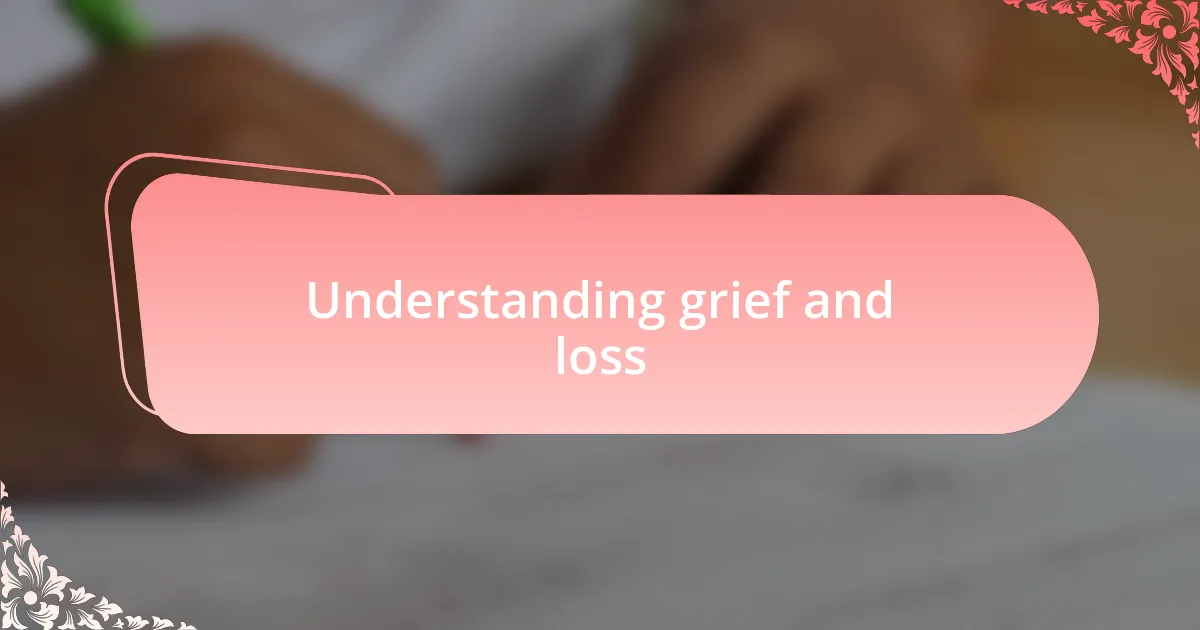
Understanding grief and loss
Grief is an emotional response that varies greatly among individuals; it can be overwhelming, confusing, and at times, isolating. I remember standing in the empty room where we spent countless joyful moments, feeling a mix of sadness and disbelief. How can someone be there one moment and gone the next? It’s a question many of us grapple with, often leading us to feel lost in the midst of our sorrow.
Loss is not just about saying goodbye; it brings with it a profound change in how we view the world. I found myself questioning everything – from my beliefs to what truly matters in life. It made me realize that grief is not simply a reaction but a journey that reshapes how we connect with our loved ones and ourselves.
As we navigate this journey, we often encounter emotions that range from anger to deep sadness. I recall feeling a tightness in my chest that seemed unbearable, longing for the comfort of familiarity. Is it normal to feel this way? Yes, it is. Understanding that these feelings are part of the grieving process can be healing, reminding us that we are not alone in our experiences.
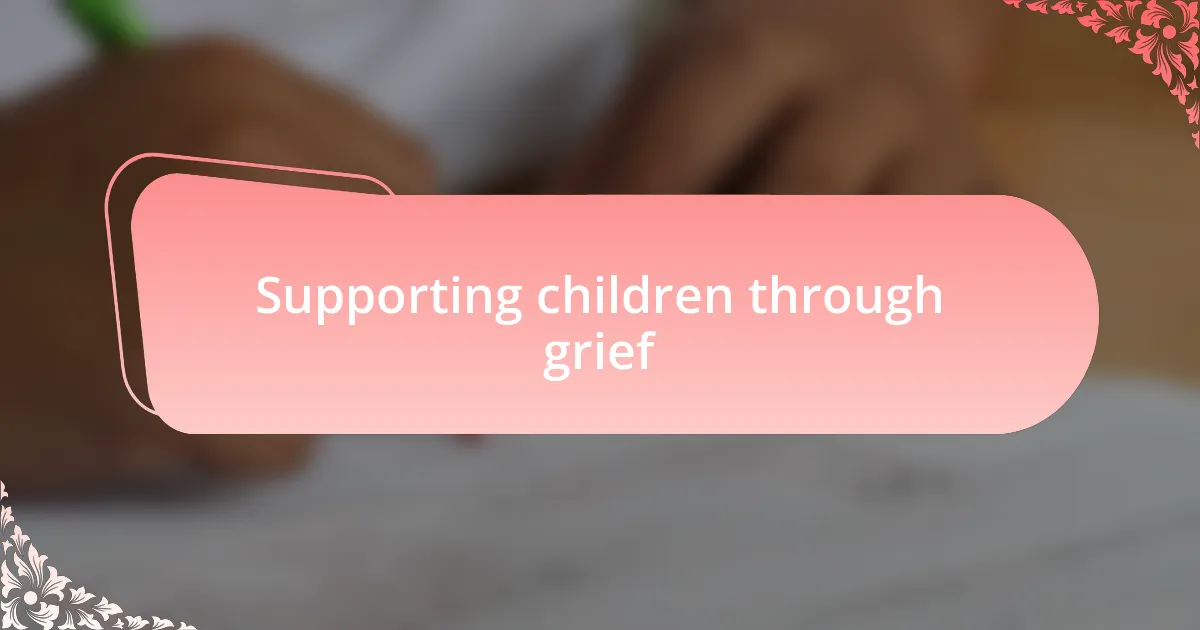
Supporting children through grief
Supporting children through grief requires a sensitive approach and an understanding of their unique emotional needs. I remember the first time I had to explain death to a child; their big, curious eyes absorbed every word as they asked, “Will they come back?” It struck me how vital it is to provide honest yet gentle answers, allowing them to process these complex emotions without feeling overwhelmed.
Creating a safe space for children to express their grief is essential. I learned that through art, play, or even story-telling, kids can navigate their feelings more easily. I once witnessed a child draw a picture of their lost pet—a simple but powerful expression of their sorrow. By encouraging children to share their thoughts and feelings, we help them feel understood and less isolated in their grief.
As discussions about loss unfold, it’s important to validate their feelings and remind them that grieving takes time. I often found myself reassuring a younger sibling that it’s completely okay to cry or even to laugh when remembering loved ones. How comforting it is to know that in sharing these emotions, we strengthen our bonds while also promoting healing together.
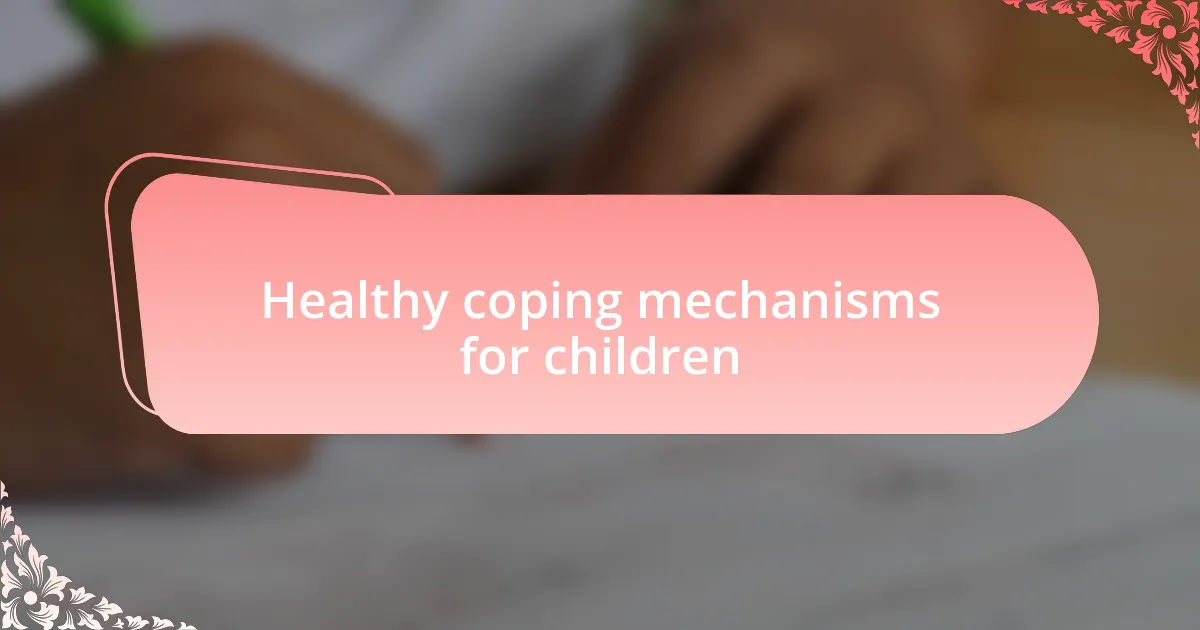
Healthy coping mechanisms for children
Healthy coping mechanisms can significantly aid children in their journey through grief. One effective approach I’ve seen is mindfulness activities, like breathing exercises or simple meditation. I remember guiding a group of children through a short exercise; after just a few minutes, I noticed their shoulders relax as they focused on their breath. Isn’t it amazing how something so simple can help calm a storm of emotions?
Another mechanism I often recommend is journaling. It might sound basic, but giving children a space to write (or even draw) about their feelings can be transformative. I had a young friend who, after losing a grandparent, filled a notebook with messages every night, like little letters to heaven. In this private space, he found a way to articulate his sadness and regain a sense of control over his narrative.
Engaging in physical activities can also be an excellent outlet for emotional expression. I once observed how a child found solace in soccer practice after his mother’s passing. The energy of running, kicking the ball, and simply being active allowed him to channel his grief into something positive. Isn’t it incredible that movement can have such a profound impact on a child’s emotional state?
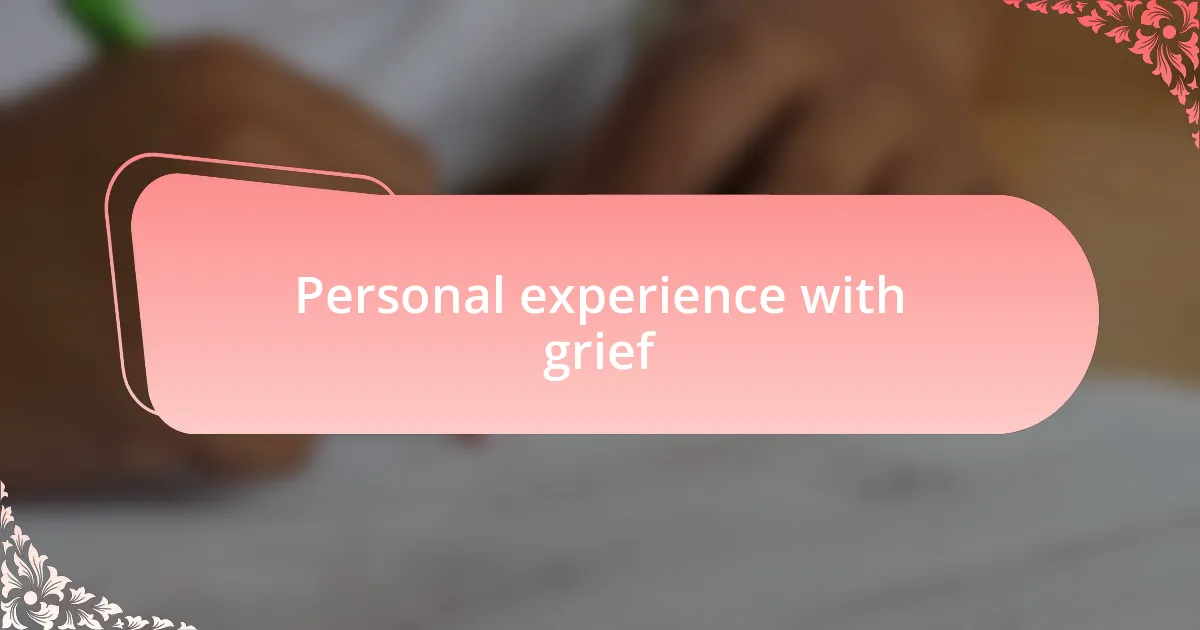
Personal experience with grief
Grief can feel like an overwhelming tide, washing over you when you least expect it. I remember the moment I lost a close family member; it felt as if time stopped. The simplest tasks, like getting out of bed or making a meal, became monumental challenges. Have you ever experienced a moment like that? It’s a feeling that’s difficult to describe but deeply etched in memory.
In my journey through grief, I discovered the power of connection. I found solace in conversations with friends who truly understood my pain. One evening, as we shared stories over a cup of tea, I realized how important it was to let others in. Instead of feeling isolated, I felt my burdens lighten as our laughter intermingled with tears. Doesn’t it strike you how sharing our experiences can pave the way for healing?
Each day presented a different shade of grief for me. Some days I felt angry, other days I experienced a profound sense of loss. I often reminisced about happy memories, but there were moments when the ache of absence was palpable. I learned that grief isn’t linear; it flows and changes, like a river carving its path through a landscape. How has your own experience with loss shaped your understanding of this emotional journey? These reflections became essential stepping stones in my recovery, helping me find a sense of peace over time.
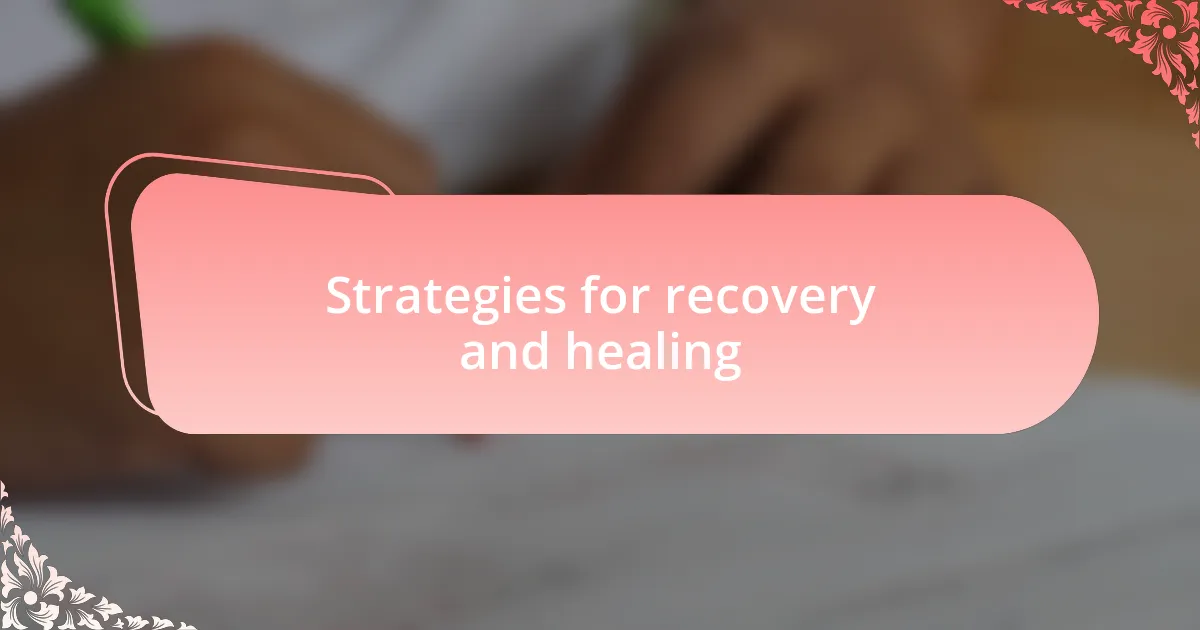
Strategies for recovery and healing
Finding effective strategies for recovery and healing became vital in my journey. I started journaling my thoughts and emotions, which transformed into a sanctuary for my grief. There were nights when I felt overwhelmed by memories, but pouring my heart onto the pages gave me clarity and a sense of release. Have you ever tried writing your feelings down? It can be incredibly liberating.
Engaging in physical activities also played a crucial role in my healing process. I remember lacing up my sneakers and taking long walks in nature, allowing the fresh air to rejuvenate my spirit. With each step, I could feel the tension easing, and my mind began to quiet. It’s amazing how much a simple walk can shift your perspective, don’t you think? By reconnecting with my body, I found a pathway to both physical and emotional resilience.
Perhaps one of the most impactful strategies was forming a support group with others who had faced similar losses. Sharing my journey with people who truly understood turned what felt like an insurmountable burden into a shared experience. I recall one poignant session where we all sat in silence, tears glistening in our eyes, yet feeling an unspoken bond. Isn’t it comforting to know that you’re not alone in your grief? These interactions fostered a sense of community that was essential for my recovery and highlighted the importance of leaning on one another.
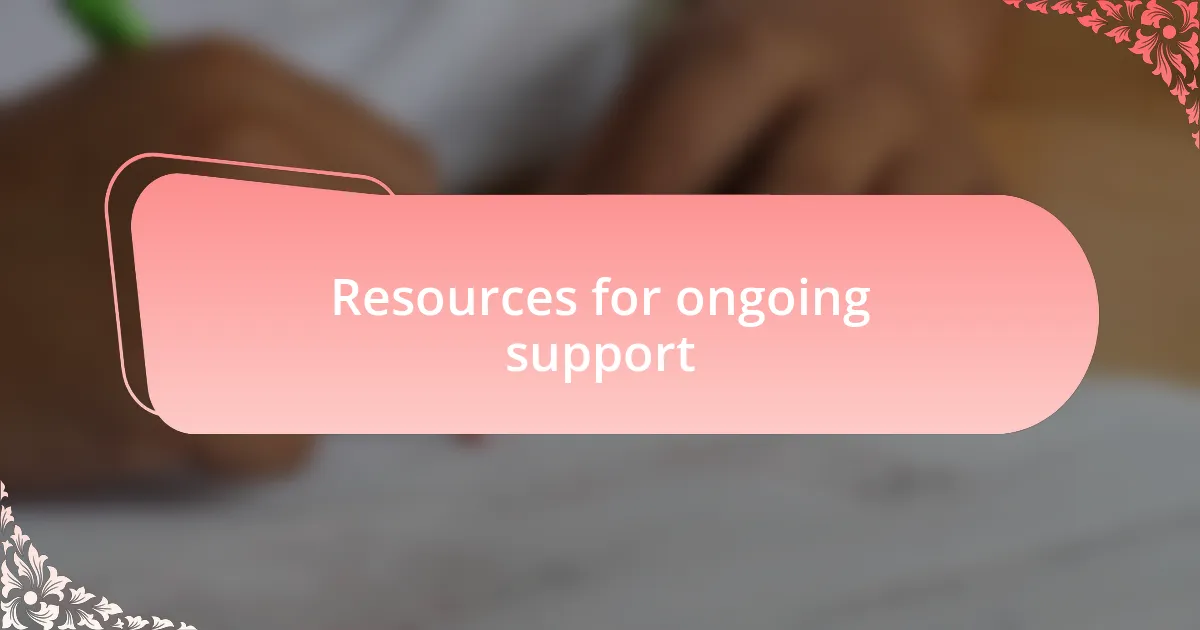
Resources for ongoing support
Finding reliable resources for ongoing support can make all the difference in navigating grief. I once stumbled upon a local community center offering workshops specifically focused on loss and healing. Attending these gatherings not only provided me with valuable tools for coping but also introduced me to individuals who shared similar experiences. Have you ever felt that sense of connection in a room full of strangers? It can truly be a lifeline.
Online forums and support groups can also be an essential resource for those seeking ongoing solace. I remember my first experience with an online chat group, where I expressed my feelings and fears without the weight of judgment. It was liberating; knowing I could reach out whenever I needed, day or night, gave me a sense of security. Have you explored virtual communities? They can provide comfort from the safety of your own space.
Professional help, whether through counseling or therapy, is another avenue worth considering. During my journey, I found that talking to a therapist allowed me to unpack my grief in a structured way. Their guidance helped me to identify patterns and coping mechanisms that I wouldn’t have recognized on my own. It’s incredible how professional support can shine a light on the path forward, don’t you agree?